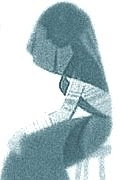It's so amazing just how much wrapping yourself around like-minded individuals and religious people gets you feeling pumped and ready to fight Shaitan and win! Alhamdullilah, its a great feeling and I recommend halaqa to everyone who ever had their faith tested. Its a way of emphasizing ideals and morals and beliefs. Its the perfect medicine to nip doubt in the bud. Doubt is an itch that should be scratched, halaqa is ointment that helps heal.
Ok -- Im talking ER jargon still -- on my road to recovery... my iman could use some topical too! :D
Last week we had halaqa after a very long hiatus, long overdue. I am so glad we did. I always leave halaqa with a fresh attitude. I know nothing should ever be compared to Hajj, where people emerge re-born, but halaqa is like a cold shower... it wakes you up and clears away the grogginess! Our halaqa topic was dream interpretation and of course you cannot talk of that topic and not have Prophet Yusuf al-Islam come up. I will begin with his (pbuh) story of interpeting dreams and then lead into a few hadiths which are always included as guidance from Khatam Ar-Rusul, Habib Allah Prophet Muhammad (saw), and then touch into a few tangential topics and discussions which are sometimes controversial, but always amazing.
Each prophet of Allah (swt) comes to the Earth with a gift: a gift of mercy from Allah (swt) in a manner in which it will aid the prophet deliver his message and wow and appeal the masses. Prophet Yusuf (as) was blessed with the ability to interpret dreams. Most of the Prophet's talents are not manifested until the need arises. Allahu alim, there is a reason for everything. Allah (swt) is the greatest planner and storyteller. He (swt) knows when to reveal how much. Prophet Yusuf's talent was not revealed until he was in prison for wrongfully being accused of a crime. The crime was attacking Zuleika, Aziz's wife -- Aziz is the second to the King at the time, a prime minister if you will. Zuleika pleaded that Prophet Yusuf (as) came unto her when in fact she had come onto him. For this he was sentenced to prison. In prison, he begins interpreting dreams of other prisoners and the interpretations make sense and hold true. One of the prisoners is released and goes to work for the King. One morning the King awakes from sleep with a strange dream on his lips.
"I saw seven fat and beautiful cows coming out of the river and start grazing in the pasture. Later, seven thin and ugly cows came out of the water and ate the other seven up. Then I saw seven green ears of wheat and seven whithered ones." - King
The former prisoner tells the King of a noble pious man who can interpret dreams and Prophet Yusuf (as) is summonned. The Prophet warns of famine and advises them to grow lots of wheat and to save most of it for the famine years. This makes sense to the King. He frees Yusuf (as) but the Prophet refuses to leave until he is proved innocent of his crime. The King further looks into the matter and all is resolved. Zuleika takes back her testimony and Prophet Yusuf (as) is a free man. Prophet Yusuf (as)'s dream interpretation skill was his ticket out of jail and helped clear him of all charges.
A few hadiths on the matter of dreams:
Volume 9, Book 87, Number 113: Narrated Abu Qatada:
The Prophet said, "A true good dream is from Allah, and a bad dream is from Satan."
Volume 9, Book 87, Number 114: Narrated Abu Sa'id Al-Khudri:
The Prophet said, "If anyone of you sees a dream that he likes, then it is from Allah, and he should thank Allah for it and narrate it to others; but if he sees something else, i.e., a dream that he dislikes, then it is from Satan, and he should seek refuge with Allah from its evil, and he should not mention it to anybody, for it will not harm him."
Volume 9, Book 87, Number 122: Narrated Abu Huraira:
I heard the Prophet saying, "Whoever sees me in a dream will see me in his wakefulness, and Satan cannot imitate me in shape." Abu 'Abdullah said, "Ibn Sirin said, 'Only if he sees the Prophet in his (real) shape.'"
Volume 9, Book 87, Number 128: Narrated 'Abdullah bin 'Umar:
Allah's Apostle said, "I saw myself (in a dream) near the Ka'ba last night, and I saw a man with whitish red complexion, the best you may see amongst men of that complexion having long hair reaching his earlobes which was the best hair of its sort, and he had combed his hair and water was dropping from it, and he was performing the Tawaf around the Ka'ba while he was leaning on two men or on the shoulders of two men. I asked, 'Who is this man?' Somebody replied, '(He is) Messiah, son of Mary.' Then I saw another man with very curly hair, blind in the right eye which looked like a protruding out grape. I asked, 'Who is this?' Somebody replied, '(He is) Messiah, Ad-Dajjal.'"
Volume 9, Book 87, Number 134: Narrated Ibn 'Umar:
I heard Allah's Apostle saying, "While I was sleeping, I was given a bowl full of milk (in a dream), and I drank of it to my fill until I noticed its wetness coming out of my nails, and then I gave the rest of it to 'Umar." They (the people) asked, "What have you interpreted (about the dream)? O Allah's Apostle?" He said, "(It is Religious) knowledge."
Volume 9, Book 87, Number 167: Narrated Ibn 'Umar:
Allah's Apostle said, "The worst lie is that a person claims to have seen a dream which he has not seen."
One of the most interesting discussions that we had was regarding the term muslim. By definition the term means one who submits to the will of Allah (swt). A couple people brought up the notion of not calling themselves muslims because they feared they were not worthy of such a huge title and responsibility for fear of having someone mistake their complete everyday actions as the actions of a Muslim. We are human. We're not perfect by design. Angels submit to the will of Allah (swt), by defintion that makes them Muslim. However, nothing is said in the accepted definition of muslim as being a conscious decision or not, as you know angels are not conscious thinkers, just doers. They do as Allah (swt) says.
The counter arguement: you can still identify yourself as a Muslim, just knowing its a work in progress.
Rebuttal: If the term is more so of an identity, not a conscious thought, whats in a name? Its all about intentions which Allah knows already. What difference does it make if I choose to title myself a muslim or not. (By any other name would still smell as sweet --- haha... Shakespeare.)
I agree before the day of Judgement Dajjal will look onto foreheads of people and be able to read who is kafir or not, BUT... whether or not you call yourself a muslim...your actions will speak loudest.
Of course discussions are the best part of every halaqa. There will be disagreements, there will be emotion. The one thing to remember: We do not know everything about Islam. Whatever we know is still but a drop next to the entire ocean. We can agree to disagree and let opinions be heard. Never should we make a mockery of anything anyone says. To seek knowledge is to want to be comfortable in an environment where one can fee safe coming to inquire and possibly resolve personal issues. At the start of every halaqa, one should recite a dua asking Allah (swt) to bless the congregation and make clear the intention to seek ilam (knowledge) as opposed to seek ways to distort the religion, its texts, morals, and/or principles in any way shape or form so as to seek personal benefit by it. Also remember, anger comes from Shaitan. When you are angry you are under his control. Rid yourself of him and calmly accept each other and their ideas.
Insha'Allah, I hope we can begin the ritual again of having halaqa as a routine. It's a blessing what a couple hours immersed in Islam can do for our soul.
:P
Tuesday, April 15, 2008
Subscribe to:
Post Comments (Atom)








2 comments:
You havent blogged in forever. What's up with that?
I've lost my inspiration. I think I killed it. Now Im mourning.
Post a Comment